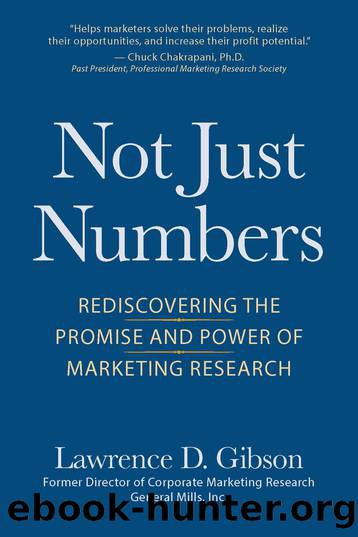Not Just Numbers by Gibson Lawrence D.;

Author:Gibson, Lawrence D.;
Language: eng
Format: epub
Publisher: Maven House
Published: 2016-10-17T00:00:00+00:00
CHAPTER 8
Learning
MARKETING RESEARCH MUST NOT BE LIMITED to ad hoc problem solving. Like all research its ultimate objective is to learn the structure of the activity in order to predict outcomes, solve problems systematically, and, in an applied science, manage the activity. Fundamental to that learning are experiments, theories, and data analysis. Unfortunately many of us are put off by the very words theory and experiment and the way these topics are taught undervalues the importance of theories and experiments and overvalues data analysis.
Theories and Facts
We tend to think of theories (I use the word in its most general sense to include any abstraction or generalization of the facts) as speculative, fanciful, and quite likely wrong, especially in comparison to facts. Facts tell us whatâs actually happened in the real world, and so we value facts more highly than theories. No wonder we gather such an enormous number of facts in marketing yet have so few validated theories. We donât realize how deeply theories and facts are intertwined, how much they depend on each other, and how the facts and the theories, not the facts alone, determine our decisions.
Theories literally determine what facts we see. Researchers are often told to gather all the facts, but this is a meaningless charge. Itâs impossible for us to gather all the facts in any situation. We simply cannot get the viewing and reading patterns, the social media involvement, the shopping habits, the perceptions and values, the decision-making processes, and the financial strategy of each and every one of our customers.
Accordingly, we simplify, summarize, and ignore, seeing only those facts that fit our theories, theories we seldom realize we have. However, a marketing researcher looking at customers will inevitably see a different set of facts than would a consumerist, a sociologist, a government regulator, or a politician, because each of them starts with a different theory.
Theories determine the methods we use to observe the world, the facts we compile into what we call knowledge, and the marketing strategy based on that knowledge. For example, thereâs a theory in marketing that the intrinsic quality of a product, independent of its name, package, or advertising, ultimately determines its market performance. This theory naturally leads to so-called blind testing of the physical product.
This may be a valid theory for cleaning products since some products really do get clothes cleaner and whiter. However, itâs not a valid theory for consumer foods since all major brands are high quality but differ in various attributes to fit the tastes of different customers.
I believe that this theoretical issue is why P&G succeeds so brilliantly with cleaning products but has failed, by its profit standards, with consumer foods.
Theories determine how we interpret the facts we do see. Weâve already discussed how the same facts can be used to support directly opposing actions. Does the fact that Southerners eat a lot of cereal but our share is low mean we should advertise our cereal in the South because the South is a high
Download
This site does not store any files on its server. We only index and link to content provided by other sites. Please contact the content providers to delete copyright contents if any and email us, we'll remove relevant links or contents immediately.
Influence: The Psychology of Persuasion by Robert B. Cialdini(4601)
The Miracle Morning by Hal Elrod(4422)
The Hacking of the American Mind by Robert H. Lustig(4086)
Pre-Suasion: A Revolutionary Way to Influence and Persuade by Robert Cialdini(3977)
Unlabel: Selling You Without Selling Out by Marc Ecko(3471)
Ogilvy on Advertising by David Ogilvy(3332)
Hidden Persuasion: 33 psychological influence techniques in advertising by Marc Andrews & Matthijs van Leeuwen & Rick van Baaren(3292)
Purple Cow by Seth Godin(3070)
Who Can You Trust? by Rachel Botsman(3025)
Kick Ass in College: Highest Rated "How to Study in College" Book | 77 Ninja Study Skills Tips and Career Strategies | Motivational for College Students: A Guerrilla Guide to College Success by Fox Gunnar(2998)
This Is Marketing by Seth Godin(2905)
I Live in the Future & Here's How It Works by Nick Bilton(2844)
The Marketing Plan Handbook: Develop Big-Picture Marketing Plans for Pennies on the Dollar by Robert W. Bly(2796)
The Power of Broke by Daymond John(2776)
Building a StoryBrand by Donald Miller(2754)
The 46 Rules of Genius: An Innovator's Guide to Creativity (Voices That Matter) by Marty Neumeier(2678)
Draw to Win: A Crash Course on How to Lead, Sell, and Innovate With Your Visual Mind by Dan Roam(2639)
The Tipping Point by Malcolm Gladwell(2559)
Market Wizards by Jack D. Schwager(2540)
